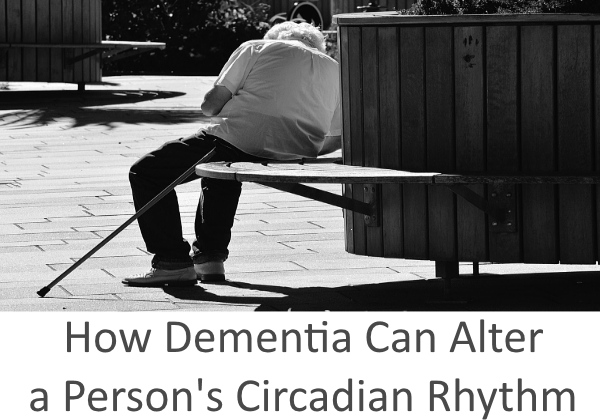Contributing Writer: Tuck Sleep Foundation

Individuals with dementia often experience poor sleep on a regular basis. Common dementia symptoms include loss of cognitive functions including memory, social skills, and emotional reactions. These can influence the ability to sleep well.
Why People with Dementia Can’t Sleep Well
People with dementia are at a heightened risk of sleep disorders. These individuals often have longer sleep latency, increased sleep fragmentation, and experience a decrease in sleep efficiency and total sleep time.
Sleep disorder symptoms often experienced include increased daytime sleepiness, nighttime wandering, confusion, and agitation, which is also known as sundowning.
People with dementia often experience progressively less REM sleep throughout the night and an increase in nighttime awakenings.
Neuronal degeneration can cause damage to the basal forebrain and reticular formation of the brain stem, which are regions that regulate sleep patterns. Circadian rhythm sleep disorders, which occur due to a misalignment with day, night, and their internal circadian clock may also be experienced.
Individuals with a circadian misalignment can experience sundowning. They may feel more confused and agitated during the late afternoon and evening. This is caused by confusion between what time it feels like and what time it actually is.
How to Help People with Dementia Sleep Better
With healthy sleep habits, individuals with dementia can sleep better which also reduces caregiver strain. A consistent sleep schedule, light exposure, healthy diet, and physical activity are ways to support healthy sleep.
• Maintain a regular sleep schedule. Falling asleep and waking up at the same time each night and day can help people with dementia sleep better and maintain regular circadian patterns. Use an alarm and help them make a commitment to get out of bed on time.
• Get light exposure. Make sure they spend time exposed to light each day. Natural sunlight can help realign their circadian rhythm, and also help them feel more alert when suffering from sleep disorders including insomnia.
Sunlight may help improve sleep patterns as well. Individuals who can’t spend time outside can use specialized lamps with bright full-spectrum lights.
• Encourage physical activity. People with dementia often have little physical activity, but exercise can help with sleep problems. Encourage walking for moderate amounts throughout the day, as well as nighttime stretching.
• Use a sleep supporting diet. Food can help individuals sleep better. Grains can raise blood sugar and lead to sleepiness, and calcium in cheese and other dairy products can trigger melatonin production, which can induce sleepiness.
Large meals, alcohol, tobacco, and caffeine should be avoided before bed to avoid discomfort and stimulation.
• Create a healthy sleep environment. A healthy sleep environment can support good sleep. Mattresses should be chosen with care, considering body size, support needs, and any pain issues the individual may be dealing with.
Beds should be used for sleep and romance only ![]() , not watching TV or eating. They should be encouraged to get out of bed each morning and not return until it’s time to sleep at night or take a nap.
, not watching TV or eating. They should be encouraged to get out of bed each morning and not return until it’s time to sleep at night or take a nap.
• Minimize feelings of stress. Life with dementia is emotionally challenging. Help them stay calm in the evening and encourage them to try evening activities that are reassuring and relaxing, such as reading or knitting instead of watching TV.
 About the Author: Tuck Sleep Foundation is a community devoted to improving sleep hygiene, health and wellness through the creation and dissemination of comprehensive, unbiased, free web-based resources.
About the Author: Tuck Sleep Foundation is a community devoted to improving sleep hygiene, health and wellness through the creation and dissemination of comprehensive, unbiased, free web-based resources.
Tuck has been featured on NPR, Lifehacker, Radiolab and is referenced by many colleges/universities and sleep organizations across the web.
Be sure to visit their site at Tuck.com or follow them on Facebook for more expert resources related to better sleep health and wellness.
If you like what you’ve read, why not receive periodic updates when you:
Subscribe to the TinT Newsletter
Have you struggled with getting your loved one on a good sleep routine or do you have a question? I’d love to hear from you in the comments below:





Leave a Reply